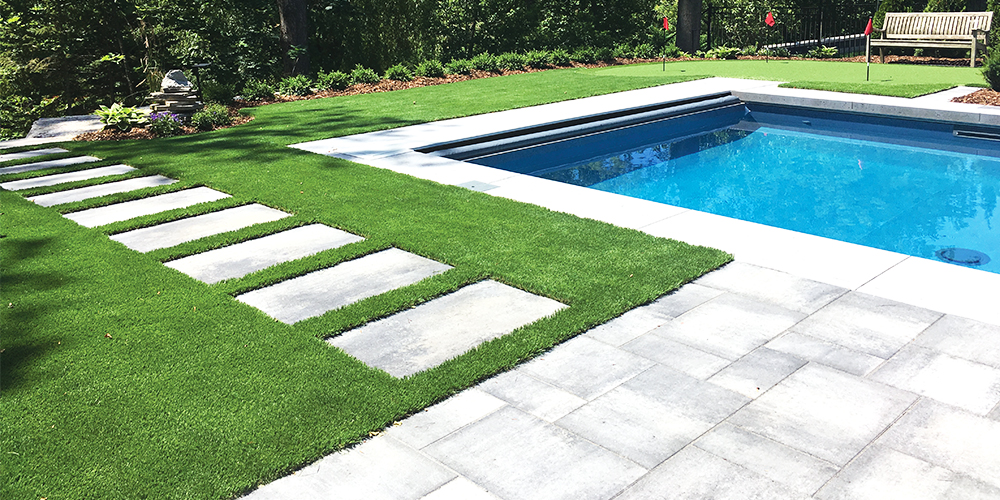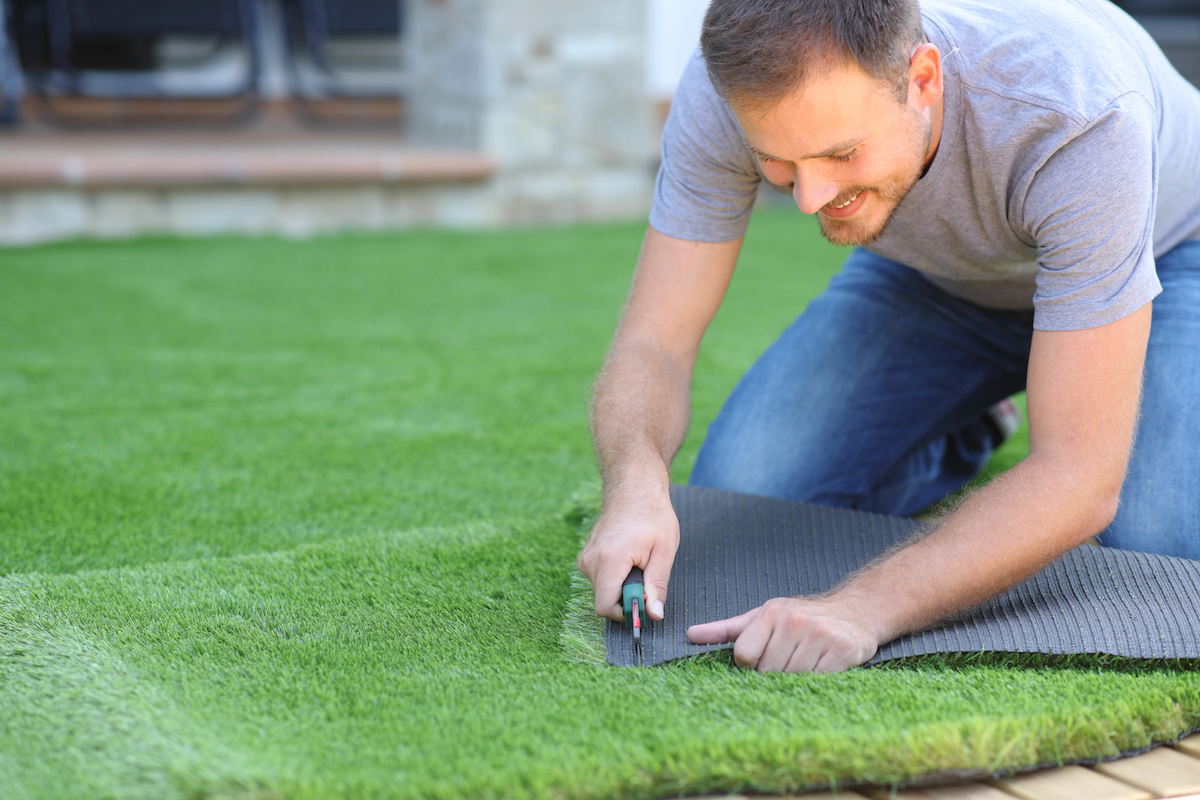Delve Into the Environmental Advantages of Opting for Artificial Grass Solutions
The adoption of artificial grass services provides a compelling opportunity to resolve pushing environmental difficulties. By substantially lowering water use and lessening the application of dangerous chemicals, these alternatives not only promote sustainable landscape design yet additionally protect local environments.
Water Preservation Conveniences
Among one of the most substantial advantages of synthetic grass is its capability to save water. Conventional turf lawns require considerable irrigation, especially in areas prone to drought or water restrictions. On the other hand, synthetic grass does not need watering, dramatically reducing the general need for water sources. This attribute is specifically helpful in deserts where water deficiency is a pushing worry.
By removing the need for regular watering, synthetic grass adds to sustainable landscape techniques and aids reduce the environmental influence of too much water usage. Moreover, the preservation of water reaches the decrease of drainage, which can lead to dirt disintegration and waterway air pollution.
Furthermore, the installment of synthetic grass allows communities and homeowners to allocate water resources a lot more successfully, focusing on important usages such as alcohol consumption water and agriculture. The shift in the direction of synthetic grass not only advertises accountable water use but additionally lines up with broader ecological goals targeted at preserving natural resources.
As neighborhoods significantly prioritize sustainability, the water preservation advantages of man-made turf provide a compelling situation for its adoption in business and property landscape design tasks.
Reduced Chemical Usage
The transition to synthetic grass dramatically lowers the reliance on chemical treatments frequently used in natural turf upkeep. Standard grass monitoring normally includes the application of fertilizers, herbicides, and pesticides to advertise development and control pests. These chemicals can posture threats to human health and wellness, local wild animals, and the setting, adding to soil and water contamination.
In contrast, synthetic grass removes the demand for these harmful substances. As soon as mounted, it requires minimal maintenance, largely being composed of regular cleansing and seldom infill replenishment. This reduction in chemical use not just profits the instant atmosphere however also adds to more comprehensive eco-friendly security. By lessening the launch of synthetic substances into the community, synthetic grass promotes healthier dirt and water systems.
Moreover, the lack of chemical drainage related to synthetic grass installments assists shield regional rivers from pollution, sustaining water life and maintaining biodiversity. Turf installation phoenix az. As neighborhoods increasingly focus on lasting practices, going with synthetic grass presents a practical option that straightens with environmental conservation goals. With this change, residential property proprietors can delight in rich eco-friendly rooms without compromising environmental wellness, leading the means for a more sustainable future
Reduced Carbon Footprint

Furthermore, the setup of man-made lawn can result in substantial water preservation. All-natural grass call for considerable amounts of water for watering, which not just includes in the carbon impact related to water extraction and treatment however additionally strains regional water resources. In comparison, artificial grass requires marginal upkeep, calling for no watering, thus substantially decreasing water use and its linked power prices.
Furthermore, the durability of synthetic grass contributes to its decreased carbon impact. With a life expectancy of as much as 15 years or more, the need Go Here for regular substitutes is diminished, resulting in less waste and reduced power usage in manufacturing and disposing of traditional turf alternatives. On the whole, fabricated lawn provides a sustainable alternative for eco mindful landscaping.
Environment Conservation
Habitat preservation is an essential factor to consider in the dispute over landscaping choices, especially when contrasting synthetic grass to natural yard. Natural grass yards commonly need extensive upkeep, consisting of the use of herbicides, fertilizers, and chemicals, which can detrimentally affect local ecosystems. These chemicals can seep into the dirt and waterways, damaging indigenous flora and animals and interfering with neighborhood habitats.
On the other hand, synthetic grass offers a chance to reduce the environmental footprint of landscape design. By choosing artificial turf, homeowners can decrease the interruption of all-natural habitats related to traditional yard treatment practices. Fabricated turf eliminates the need for hazardous chemicals, thereby protecting nearby wildlife and maintaining the honesty of surrounding environments. The installation of synthetic grass can lead to the conversion of previous lawn locations right into even more biodiverse landscapes, such as pollinator yards or indigenous plant locations, which can sustain neighborhood wild animals.
Inevitably, the change to fabricated lawn not just preserves water and lowers upkeep efforts however likewise promotes a much more unified partnership in between human tasks and the all-natural setting, advertising environment conservation at the same time.
Long-Term Sustainability
Long-lasting sustainability is an essential consider evaluating the benefits of man-made grass over traditional yard yards. One of one of the most substantial benefits of artificial lawn is its longevity; it can last as much as 15-20 years with minimal upkeep, whereas natural have a peek here grass calls for regular reseeding and replacement. This long life minimizes the need for consistent resources, such as water, fertilizers, and chemicals, which are crucial for maintaining a healthy and balanced turf lawn.
In addition, man-made grass contributes to a decrease in carbon emissions connected with yard care tools. Standard lawns usually need gas-powered mowers, leaners, and blowers, all of which add to air pollution. Arizona turf. On the other hand, synthetic grass gets rid of the need for such devices, promoting a cleaner environment
In addition, the manufacturing of synthetic grass increasingly makes use of recycled products, improving its sustainability account. As manufacturers embrace environmentally friendly techniques, the environmental impact of synthetic lawn continues to reduce.

Final Thought
The fostering of synthetic grass solutions offers considerable ecological advantages, consisting of considerable water conservation, lowered dependence on hazardous chemicals, and a reduced carbon impact. Moreover, artificial lawn aids in maintaining natural environments by reducing land disruption and promoting lasting sustainability through making use of resilient products. Collectively, these factors emphasize the potential of synthetic grass to contribute positively to ecological health and wellness and offer a sensible choice to typical landscape design practices in a progressively resource-conscious world.
In comparison, man-made turf does not require watering, substantially minimizing the general need for water resources. By reducing the launch of synthetic compounds right into the ecosystem, artificial turf advertises healthier dirt and water systems.
Furthermore, the setup of synthetic turf can result in significant water preservation. In comparison, artificial turf needs minimal maintenance, calling for no watering, therefore significantly decreasing water usage and its connected energy expenses.
